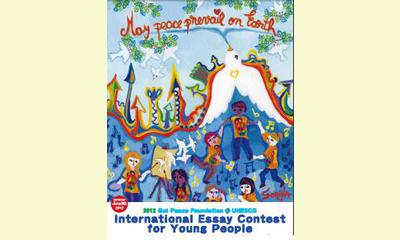|
|
Creating the Future We Want: 2012 International Essay Contest for Young People
an article by Goi Peace Foundation
This annual essay contest is organized by The Goi Peace Foundation and UNESCO in an effort to harness the energy, imagination and initiative of the world's youth in promoting a culture of peace and sustainable development. It also aims to inspire society to learn from the young minds and to think about how each of us can make a difference in the world.

click on photo to enlarge
As today's young people are crucial for the shaping of our future, it is imperative that they are enabled to develop to their full potential. UNESCO's objective is to help empower young people, reaching out to them, responding to their expectations and ideas, and fostering useful and long-lasting skills.
The Contest is endorsed by the Ministry of Education, Culture, Sports, Science and Technology of Japan, the Japanese National Commission for UNESCO, Japan Private High School Federation, the Japan Broadcasting Corporation, Nikkei Inc., and the Tokyo Metropolitan Board of Education. It is supported by FELISSIMO CORPORATION.
The theme is "Creating the Future We Want". Future begins with the vision we hold now. What kind of future do you wish to create for yourself and the world? Please share your dream and ideas for making it a reality.
Essays may be submitted by anyone up to 25 years old (as of June 30, 2012) in one of the following age categories: a) Children (ages up to 14); b) Youth (ages 15 - 25)
Essays must be 800 words or less in English, French, Spanish or German; or 1600 characters or less in Japanese, typed or printed.
Entries must be received by June 30, 2012.
Click here for further information on the guidelines, awards, and address to which essays must be submitted online or by postal mail.
|








|
DISCUSSION
Question(s) related to this article:
Can children be involved in the peace process through literacy?,
* * * * *
Latest reader comment:
Students, especially children are easily moved when they hear about other children. Parents and teachers should take time to explain to students about world situations. Show them pictures or documentaries so that they will have a better understanding of how they can promote peace. Simple facts of life like living simply, recycling, protecting the environment can be shared with them so that they develop a different kind of maturity - be prepared to serve others than to be served. They will realise that peace is important if you want to improve the condition of the unfortunate. As they grow, they choose careers whereby they will be able to meet the needs of the unfortunate.

|
|









